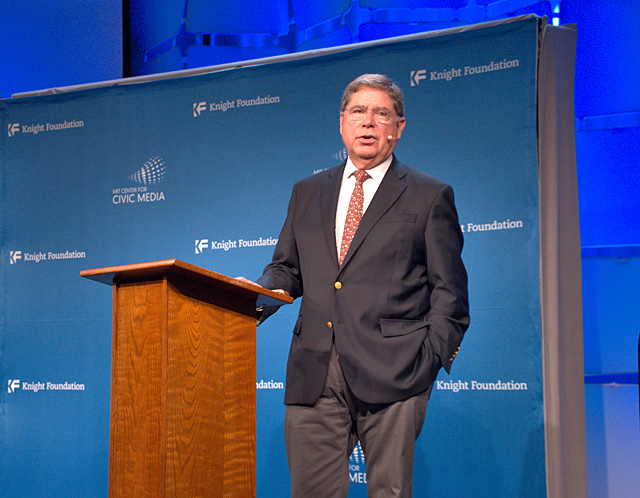
Knight to expand support for open Internet efforts
Knight President Alberto Ibargüen speaking at the Knight-MIT Civic Media Conference. Credit: Chris Barr.
Knight Foundation will deepen its support for an open and accessible Internet in coming months, President Alberto Ibargüen said Monday, after announcing nine winners of a Knight News Challenge dedicated to the topic.
In a speech that equated Internet openness with free speech, he urged his audience at the 2014 MIT-Knight Civic Media Conference in Cambridge, Mass., and on Livestream to engage the topic, both by emailing him with ideas about how Knight could advance the issue and giving their views on proposed Federal Communications Commission regulations that could allow different speeds for different types of content on the Internet.
“The debate is on as to whether this tiering of access to Internet is a necessary by-product of our economic system and will provide even better services for those who can afford them, or whether this is essentially anti-democratic, since Internet has become the public square and there may be no limitations to citizens to their public square,” Ibargüen said.
Later in his speech, Ibargüen made clear he thought that debate should be viewed first through the lens of free expression.
“As a longtime advocate of our First Amendment, I believe we have a right to speak because we are citizens, not because we are given permission to speak. I believe we should do everything possible to ensure that the right to speak, the right of expression on Internet, is just that, a right, not a license subject to approval,” he said.
The debate has profound economic implications as well, but not just for network providers. Ibargüen cited Lawrence Lessig’s review of the 2010 movie “The Social Network,” about the creation of Facebook in a Harvard dorm room. The hero is not Mark Zuckerberg, but rather the Internet, which allowed Zuckerberg to create Facebook with little money and without permission.
If that kind of access is dismantled, “we will return more to the world where success depends upon permission. And privilege. And insiders. And where fewer turn their souls to inventing the next great idea,” Lessig concludes.
Ibargüen said that the focus on promoting and protecting an open and accessible Internet was a natural evolution in Knight’s strategy, albeit an unforeseen one. From its start nine years ago, the News Challenge focused on finding digital ways to deliver news to communities, and building networks of engaged leaders who would advocate for informed communities.
Knight’s assumption was that access would be cheap – like newspapers – or free – like television (once you bought the set). Knight did not anticipate access being so dependent on commercial cable, which is expensive, or the practice of tiering, which ups the ante. Given the high stakes and bare-knuckle politics, “perhaps we were naïve,” Ibargüen said.
In the coming months, Knight will do more work to strengthen the Internet as a platform for free expression and innovation, including putting it at the center of the annual Aspen Institute Forum on Communications and Society, and supporting analysis of investments in the sector. But as always, we want good ideas from anywhere on things we can do – through a News Challenge or other mechanism – to help keep the Internet free and equally accessible to all.
Andrew Sherry is vice president of communications for Knight Foundation.
Recent Content
-
Journalismarticle ·
-
Journalismarticle ·
-
Journalismarticle ·


